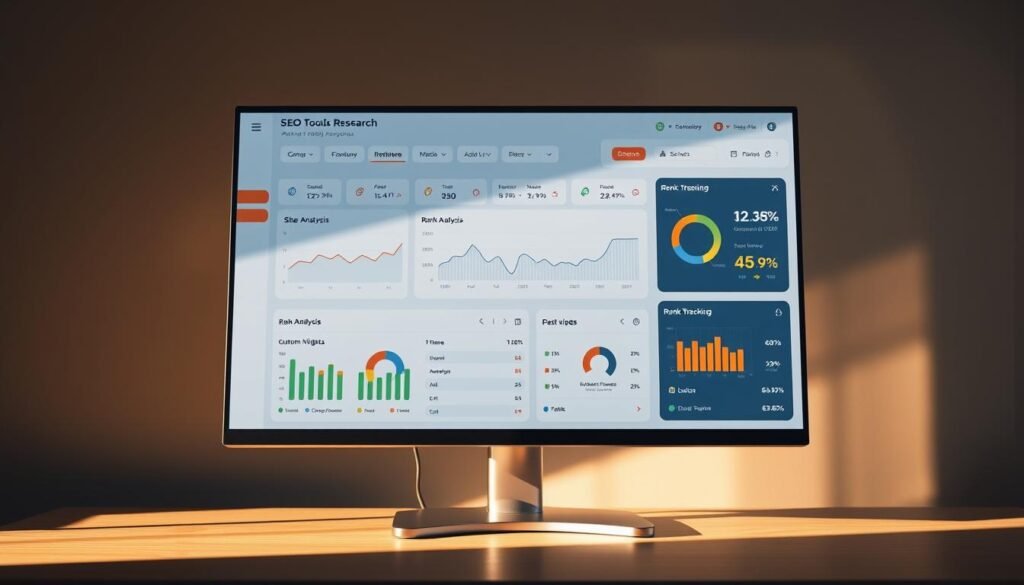Did you know 75% of users never look beyond the first page of search results? This fact shows how crucial it is to know about SEO tools. As someone in digital marketing, I’ve found that the right tools can really change how visible your website is.
Finding your way through search engine optimization tools doesn’t have to be hard. I’ve learned that choosing the right tools can greatly improve your online success.
The digital world keeps changing, and to stay on top, you need smart strategies. Pre and post SEO tools give you the insights and data to make your content better, understand your audience, and get higher in search rankings.
Key Takeaways
- SEO tools are essential for improving search engine rankings
- Understanding both pre and post SEO tools can boost website performance
- Strategic tool selection helps target audience more effectively
- Continuous optimization is key to digital marketing success
- Free and paid tools offer unique advantages for different business needs
Understanding Pre and Post SEO Tools
Understanding the digital world needs smart use of SEO tools. These tools are split into two main types: pre-SEO and post-SEO. Each type has its own role in making a strong website strategy.
Pre-SEO tools are like digital research buddies. They help me find the right keywords, check content ideas, and see what the competition is doing. With a website seo checker, I can spot chances and avoid problems early on.
Exploring the SEO Tool Ecosystem
My toolkit has key pre-SEO tools:
- Keyword research platforms
- Content potential analyzers
- Competitor mapping tools
The Strategic Importance of SEO Tools
Post-SEO tools are just as important. These tools track performance, do audits, and give insights. They turn data into plans that work.
It’s all about how these tools work together. They help create a complete SEO plan that gets real results online.
Key Pre-SEO Tools I Use

SEO is complex, and I need strong tools to find insights, improve content, and outdo rivals. I’ve found some top SEO tools that boost my digital marketing. They make my efforts more effective and strategic.
I use a mix of free SEO tools and premium options. They offer full support for my digital marketing plans.
Keyword Research Tools for Better Targeting
Choosing the right keywords is key for SEO success. I use several tools to find great search terms:
- SEMrush: Offers deep keyword analysis
- Ahrefs: Has detailed keyword research features
- Google Keyword Planner: A free tool for starting keyword searches
Content Analysis Tools to Align My Strategy
Creating content that pleases search engines and readers needs advanced analysis. My top content analysis tools help me make better content:
| Tool | Key Features | Best For |
|---|---|---|
| Clearscope | Content optimization | In-depth content analysis |
| MarketMuse | AI-powered content insights | Content strategy planning |
Competitor Analysis Tools to Stay Ahead
Knowing my competitors’ moves is vital to stay ahead. I use top SEO tools for valuable insights:
- SpyFu: Offers detailed competitive keyword research
- SEMrush Competitive Analysis: Tracks competitors fully
- Moz Pro: Analyzes competitors’ links
These tools help me craft targeted, effective SEO plans. They drive real results.
Effective Post-SEO Tools to Implement
After publishing content, it’s key to track and boost your SEO. I’ve found great tools to help me do this well.
Using strong post-SEO tools can change your digital marketing game. My top picks give me deep insights into how my site is doing and where I can get better.
Performance Tracking Tools to Measure Success
I use certain seo ranking tools for real-time analytics. They show me:
- How keywords are doing
- Where my traffic comes from
- How users interact with my site
- My conversion rates
SEO Audit Tools for Continuous Improvement
My top seo audit tool checks websites thoroughly, finding areas for improvement. It looks at important things like:
- Site speed
- How well it works on mobile
- Any broken links
- How well my content is optimized
Reporting Tools to Share Insights with Stakeholders
It’s important to share how my SEO is doing. I use easy-to-use reporting tools. They make clear, nice-looking dashboards that show my successes.
Effective post-SEO tools turn raw data into actionable insights.
My Favorite Online SEO Tools for Every Step
SEO can seem daunting, but I’ve found great tools to help. From easy-to-use platforms to advanced tools, there’s something for everyone. These tools are perfect for improving your search engine rankings.
For beginners, SEO tools like Mangools make things simple. They offer a user-friendly interface that helps you grasp keyword research and website optimization. This is great for those new to SEO who don’t want to get lost in technical jargon.
Advanced marketers will love tools that give deep insights. Clearscope uses AI to optimize content, helping me refine my strategy. For small businesses on a budget, SEOptimer offers valuable tips without costing a lot.
I use a variety of SEO tools in my work. They range from affordable to powerful, fitting different skill levels and business needs. Whether you’re solo or part of a team, the right SEO tools can boost your online presence and help you rank higher.


